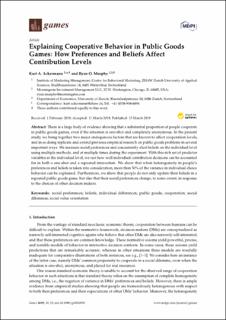Please use this identifier to cite or link to this item:
https://doi.org/10.21256/zhaw-5046| Publication type: | Article in scientific journal |
| Type of review: | Peer review (publication) |
| Title: | Explaining cooperative behavior in public goods games : how preferences and beliefs affect contribution levels |
| Authors: | Ackermann, Kurt Alexander Murphy, Ryan O. |
| DOI: | 10.21256/zhaw-5046 10.3390/g10010015 |
| Published in: | Games |
| Volume(Issue): | 10 |
| Issue: | 1 |
| Page(s): | 15 |
| Pages to: | 48 |
| Issue Date: | 2019 |
| Publisher / Ed. Institution: | MDPI |
| ISSN: | 2073-4336 |
| Language: | English |
| Subjects: | Cooperation; Public good; Social value orientation; Social preference |
| Subject (DDC): | 150: Psychology 302: Social interaction |
| Abstract: | There is a large body of evidence showing that a substantial proportion of people cooperate in public goods games, even if the situation is one-shot and completely anonymous. In the present study, we bring together two major endogenous factors that are known to affect cooperation levels, and in so doing replicate and extend previous empirical research on public goods problems in several important ways. We measure social preferences and concurrently elicit beliefs on the individual level using multiple methods, and at multiple times during the experiment. With this rich set of predictor variables at the individual level, we test how well individual contribution decisions can be accounted for in both a one shot and a repeated interaction. We show that when heterogeneity in people’s preferences and beliefs is taken into consideration, more than 50% of the variance in individual choice behavior can be explained. Furthermore, we show that people do not only update their beliefs in a repeated public goods game, but also that their social preferences change, to some extent, in response to the choices of other decision makers. |
| URI: | https://digitalcollection.zhaw.ch/handle/11475/16628 |
| Fulltext version: | Published version |
| License (according to publishing contract): | CC BY 4.0: Attribution 4.0 International |
| Departement: | School of Management and Law |
| Organisational Unit: | Institute of Marketing Management (IMM) |
| Appears in collections: | Publikationen School of Management and Law |
Files in This Item:
| File | Description | Size | Format | |
|---|---|---|---|---|
| 2019_Ackermann_Explaining_Cooperative_Behavior_in_Public_Goods_Games.pdf | 596.52 kB | Adobe PDF |  View/Open |
Show full item record
Ackermann, K. A., & Murphy, R. O. (2019). Explaining cooperative behavior in public goods games : how preferences and beliefs affect contribution levels. Games, 10(1), 15–48. https://doi.org/10.21256/zhaw-5046
Ackermann, K.A. and Murphy, R.O. (2019) ‘Explaining cooperative behavior in public goods games : how preferences and beliefs affect contribution levels’, Games, 10(1), pp. 15–48. Available at: https://doi.org/10.21256/zhaw-5046.
K. A. Ackermann and R. O. Murphy, “Explaining cooperative behavior in public goods games : how preferences and beliefs affect contribution levels,” Games, vol. 10, no. 1, pp. 15–48, 2019, doi: 10.21256/zhaw-5046.
ACKERMANN, Kurt Alexander und Ryan O. MURPHY, 2019. Explaining cooperative behavior in public goods games : how preferences and beliefs affect contribution levels. Games. 2019. Bd. 10, Nr. 1, S. 15–48. DOI 10.21256/zhaw-5046
Ackermann, Kurt Alexander, and Ryan O. Murphy. 2019. “Explaining Cooperative Behavior in Public Goods Games : How Preferences and Beliefs Affect Contribution Levels.” Games 10 (1): 15–48. https://doi.org/10.21256/zhaw-5046.
Ackermann, Kurt Alexander, and Ryan O. Murphy. “Explaining Cooperative Behavior in Public Goods Games : How Preferences and Beliefs Affect Contribution Levels.” Games, vol. 10, no. 1, 2019, pp. 15–48, https://doi.org/10.21256/zhaw-5046.
Items in DSpace are protected by copyright, with all rights reserved, unless otherwise indicated.